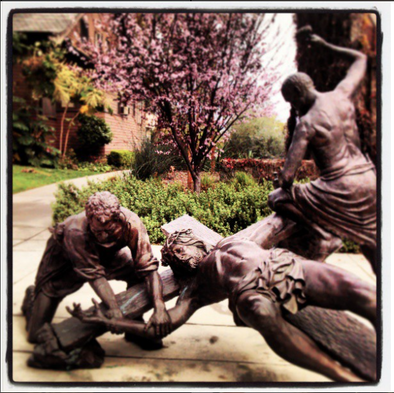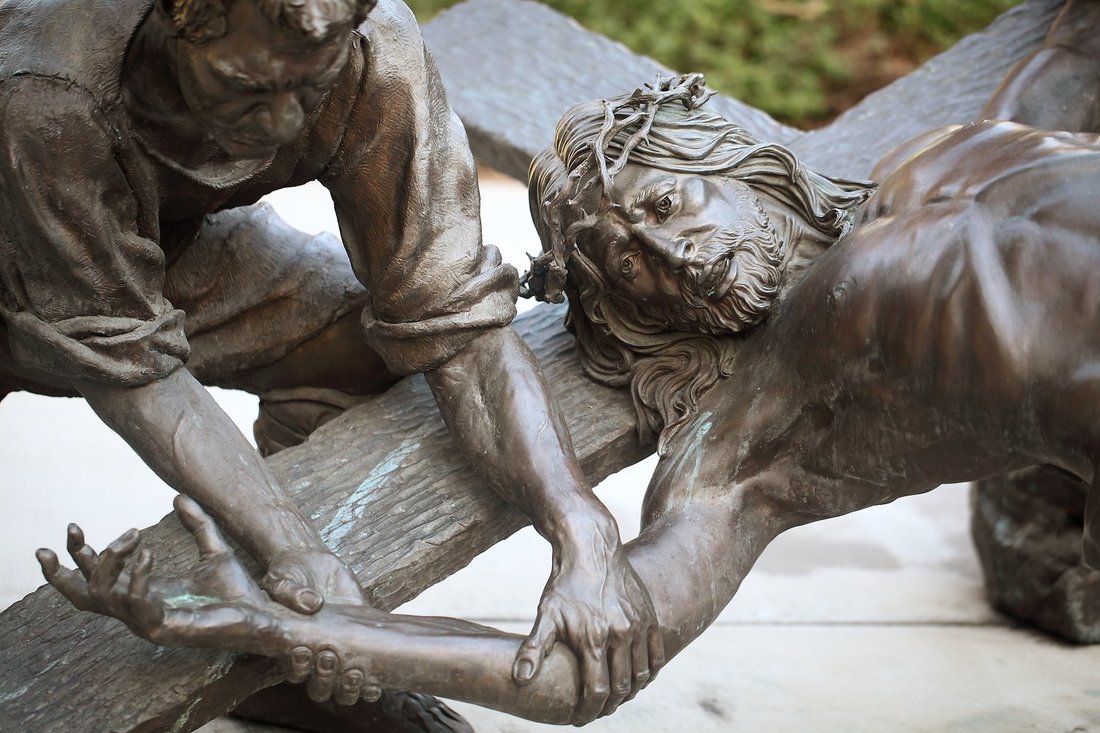Someone once said, “The cross has become so ordinary that we hardly see it anymore.” Let’s think about that for a moment.
That’s like saying the noose of the Ku Klux Klan or the gas chambers of Nazi Germany are as noticeable as the dust on our history books. The cross was a serious weapon of war. And I doubt anyone who witnessed a loved one being crucified ever forgot the brutality and pain this innocuous piece of wood represented. That was its point. It was designed to make a lasting impression. The cross of Christ was not ordinary – but extraordinary. I find it hard to believe that we’ve become so jaded that we can no longer see God’s ability to take something so horrific and humiliating, and transform it into something so honorable and liberating. Christopher Slatoff, an artist who has been working on a series of sculptures depicting the Stations of the Cross, wants us to see this iconic weapon for it’s true beauty – God’s redeeming love. While the Stations of the Cross is highly symbolic to the church, Slatoff wanted the public to see the humanity of Jesus, in it’s rawest form, so we wouldn’t forget the divine gift his sacrifice provided. One of his sculptures entitled “Jesus Being Nailed To The Cross” (pictured above) is located on the campus of Fuller Seminary. To stand above it, as the Roman soldiers bang the nails into Jesus’ flesh, you realize this is anything but ordinary. That was his point. I had the privilege to meet Slatoff while I was a student at Fuller. His lecture on this particular sculpture, and all its well-researched details, would change my perspective indefinitely. One of the things that stood out to me was not the agony carved into Jesus’ face or the serious concentration of the two hammer-wielding soldiers who were just doing their job. Instead it was the ordinariness of the wood beams that formed the cross he was being nailed to. They were plain and nondescript – nearly invisible to all the drama that was unfolding. I’m sure most by-standers don’t focus on the wood, muchless what they created – a vile manner of execution that inflicted an anguished death and struck fear into all who witnessed its despicable power. It was by far the greatest weapon Caesar had in its arsenal. Killing one person could silence a thousand more from rebelling against him. Remember the central message of Jesus’ ministry was, “The Kingdom of God is at hand!” Declaring this was dangerous. If God is King over all, then what role does Caesar play? The cross was supposed to silence such nonsense once and for all. But instead it set into motion a plan only God’s creative imagination could execute. This one cross, made up of two ordinary wood beams, held a man whose death was anything but ordinary. While his crucifixion was the world’s way of saying no to everything Jesus stood for, it would come to represent God’s affirming love and redemption for human kind. Those who fixed their eyes upon it and believed would be saved, redeemed, and forgiven. Each time I walked passed Slatoff’s sculpture I found it harder and harder to ignore God’s extraordinary love pouring out from those nail holes; calling out to me “This is my body and blood which is given to you.” It’s impossible to see it as anything less than grace. Jill Carattini writes, “The symbol of the cross is an instrument of death. It is also, curiously, a symbol of God’s kindness. Far from ordinary, it suggests, at the very least, a beautiful and terrible love quite beyond us.” The way I see it, the cross is us. It represents our moral bankruptcy when we are left to our own devices. The body, broken and bleeding on it, is God’s most vulnerable love and restoration. And Jesus’ death and resurrection is a raw reminder that God’s love can never be silenced. It can never be killed. In giving himself over completely and willingly to God, as a living sacrifice for us all, Jesus would become triumphant over death. But in order to get there he had to make the painful journey. And so too must we. This is not an ordinary request, is it? But the good news is: God will use whatever means necessary to reclaim us as one of his own. This means God can use a broken marriage to transform a broken heart. God can use the murder of innocent students to bring peace into a violent world. God can take tears of sorrow to bring about shouts of joyous hallelujahs. Those who lined the streets of Jerusalem to welcome Jesus had no idea where his journey was headed. But we do. We know the cross is just a stepping stone to everlasting life. Maybe that’s why it seems ordinary, or why we might over look it. We are no longer shocked or afraid, because we know the tomb will be empty when they roll away the stone on Easter morning. But while we seem know that God can do the most extraordinary things, we still have trouble seeing God at work within ourselves. If God can take two ordinary planks of wood and do the impossible, then imagine what God’s doing right now in you. The place you are standing today is no accident. Every experience you having, is preparing you for the place God wants you to be tomorrow. We do not know which part of our life God will use to accomplish our greatness, all we know is that we must pick up our cross and make the journey from ordinary to extraordinary. The world may overlook the power of the cross. They might see it as an utterly foolish thing to do, as Paul wrote to the churches in Corinth. But that does not stop God from doing what God wants to do. Like a sculptor to clay, God shapes and molds our sorrow and pain into something more beautiful than we can ever realize. The world can try to strip the cross of it’s meaning, or empty it of its beauty, hope, and depth. But what the Romans and the world would eventually come to discover, the cross couldn’t be emptied of Christ. Even where the cross is obscure, Christ is still near - working within each one of us to redeem all of creation back to where we belong…in the extraordinary love of God
0 Comments
Leave a Reply. |
Ian MacdonaldAn ex-copywriter turned punk rock pastor and peacemaker who dedicates his life to making the world a better place for all humanity. "that they all might be one" ~John 17:21“Prius vita quam doctrina.”
~ St. Thomas Aquinas (1225–1274) * “Life is more important than doctrine.”
Archives
June 2024
|

